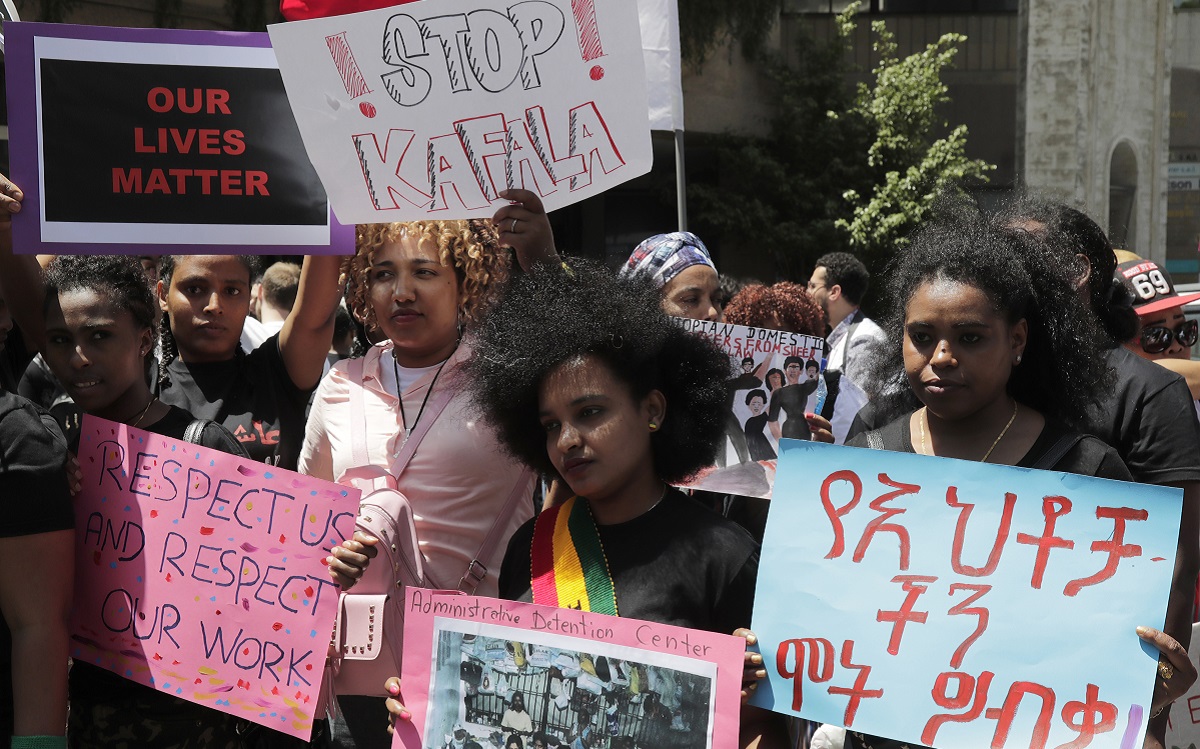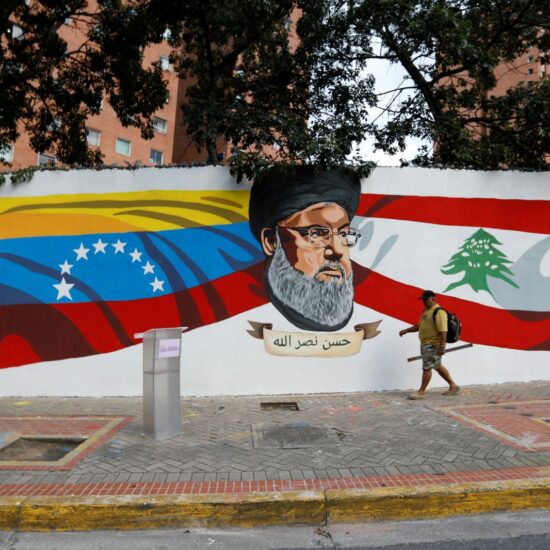
Francisca Ankrah was only 6 years old when she experienced racism.
“A young kid came up to me on the playground and said that when I grow up I’m going to be a Sri Lankan,” Ankrah told NOW.
For a child of two immigrants, a Ghanaian and a Filipina, the insult did not make sense. But for the Lebanese child, it came naturally to use the term “Sri Lankan” as an insult, equating it with being a domestic worker, a status that is deemed inferior in Lebanese society.
That’s how Ankrah grew up in Lebanon.
Instead of using the term “domestic worker”, it was normal to call someone “Sri Lankan” and “Bangladeshi” regardless of where they were actually from to signal what type of jobs they were employed to do. Moreover, the terms have been folklorized and are used as derogatory terms to describe darker skinned Lebanese.
Ankrah moved to Canada two years ago, but she says she is still haunted by the trauma of growing up in Lebanon.
“The effects of racism and abusive practices in Lebanon don’t only occur [and stay] there. Migrants carry them everywhere they go. It stays with them for a really long time,” Ankrah said.
Many rights groups point at the Kafala, or sponsorship, system which was established in the 1950s and allows Lebanese employers to control the lives and freedom of movement of foreign employees. But the recruiters, social scientists, and rights advocates together say that Kafala is just the system that creates the conditions for abuse, racism goes far beyond the law.
Over the years, migrant workers have been denied entry to private pools and other hangout spots. Many have also been abused and enslaved. But the stereotyping and discrimination is more subtly embedded in the hierarchical system that dictates their wages, as migrant workers in Lebanon are paid differently according to skin color and country of origin.
Daryn Howland, a doctoral researcher who researches the Kafala system at SOAS University of London explained that Lebanese employers adopted racist attitudes towards domestic workers which contributed to the rise of structural violence against the workers. It all resulted in an unjust racial hierarchy on the domestic worker labor market where people who work the same job and offer the same services are paid differently simply because of their country of origin or skin color.
“Some consider the people who come from poor countries unworthy of the same rights as the Lebanese or westerners. There’s this ascending scale of human value based on their nationality that decides their worth and rights,” Howland told NOW.
Rights according to stereotypes
Ankrah’s father, who was Ghanaian, was forced to ignore his health complications and spinal injury when working for employers who made him lift heavy objects and did not allow him enough time to recover from surgery.
“Employers would ignore medical advice saying he was strong enough to resume the work and that he was using his health as an excuse because he’s lazy,” Ankrah said. She says that her father was met with an attitude that stemmed out of the “slave ownership” mindset that stereotyped black men as being lazy, ill, and irresponsible.
Her mother, a Filipina domestic worker, was regularly harassed on the streets and on public transportation.
Her parents were discriminated against differently, according to stereotypes, she explained.
There are around 250,000 domestic workers in Lebanon. Before the crisis, women from Ethiopia, Sri Lanka, and the Philippines made up the majority of that number. But due to governmental disputes and multiple abuse reports, Lebanon faced several bans that limited employment opportunities.
In 2008, Ethiopia banned its citizens from traveling to Lebanon for work. The Philippines suspended the deployment of domestic workers to Lebanon in March of 2020 due to the deteriorating economic crisis. Recruiters turned elsewhere to find cheap labor.
But domestic labor has been seen as a market of exchangeable commodities that were priced and treated differently according to their skin color, country of origin, education level, age, and gender.
The hierarchy puts Filipinas at the top of the list, Bangladeshi and Ethiopian women come second, and women from various other African states come last. The difference is not only in wages, but also in the treatment they receive from many employers.
Nada*, the head of a recruitment agency said that in recent years, Ghanaian and Sieraleonen women were in more demand, especially because they were paid lower wages, between $200-$250, while domestic workers brought from the Philippines had their salaries begin at $400.
Some consider the people who come from poor countries unworthy of the same rights as the Lebanese or westerners. There’s this ascending scale of human value based on their nationality that decides their worth and rights.
The lowest salaries, ranging between $200 – $250, were given to African, Ethiopian, and Bangladeshi women. The highest they could get was $300, depending on their employer’s whims.
Filipinas had a minimum wage of $400, which was considered low. When working for diplomats or rich families, their salaries could amount to $2000 – $3000.
Working freelance was also a different experience based not only on nationality but on the area in which the worker was employed.
French-speaking migrant workers from African countries would be hired by French-speaking people residing in Beirut. These would get paid around 60, 000-80, 000 LBP per hour, while their Bangladeshi counterparts that worked in lower-class areas, would get paid around 10,000 LBP per hour.
Filipinas on the other hand were the highest-paid. Because they speak English, they can work for foreign clientele and charge in dollars per hour.
One domestic worker who works in a home and also does freelance jobs in her spare time said there was always a difference in the way domestic workers were paid according to their nationality. In the neighborhood of Mar Mikhael where she has been working for 15 years, she said a SriLankan would be paid around 20,000 LBP per hour, an Ethiopian around 30,000 LBP/hour and a Filipina, 50,000 LBP per hour.
“It also depends a lot on how you negotiate with the client, but yes, there are certain limits you can’t cross,” she told NOW.
For recruiters, the difference in wages makes sense due to training and the cost of getting a work permit.
“Filipinas receive formal training before leaving their country and are also taught English. It costs around $7000 – $8000 to sneak them illegally into Lebanon due to the current restrictions,” the recruiter said, under the condition of anonymity.
Only well-off families can currently afford to pay the cost of a domestic worker from the Philippines and the presence of a domestic worker, especially wearing a uniform, is seen as an indicator of high status and prestige, Nada explained.
Maria, 54, a Filipina domestic worker, says she has also been working for an 84-year-old woman for 15 years. She earns $600 a month and gets an extra $100 as an allowance on her days off.
“I love it here. Her kids bring me gifts and we all go hiking together when they’re in town,” Maria told NOW.
But for Monica, who is from Sri Lanka, it’s much harder to get that amount of money. She works in several houses, is paid per day, and earns as little as 80,000 LBP for cleaning one house three times a week. She said she cleans 1-2 houses per day and she makes 320,000 – 400,000 LBP per week. “It depends, some people can afford to pay me a bit more, others give me less. It also depends how big the house is,” she explained as she hurried to leave to avoid more questions.
“Shopping for options”
In 2006, the government of the Philippines was the first to mandate a $400 minimum wage for its workers. Howland explained that, in addition to their government’s support, the lighter skin color and a higher level of training or education allowed domestic workers from the Philippines to benefit from better work conditions.
A simple example would be their ability to have a day off while domestic workers from other states could not. This was due to the mistrust in other nationalities.
“Africans are seen as poor, uneducated and unskilled, so they were met with an infantilized attitude that sought to limit their mobility and control their freedom. They were not seen as individuals capable of free agency,” Howland said.
Africans are seen as poor, uneducated and unskilled, so they were met with an infantilized attitude that sought to limit their mobility and control their freedom. They were not seen as individuals capable of free agency.
Unlike other industries, recruiters and employers do not look for skills or qualifications when hiring a worker, the researcher explained. They would instead focus on the degree of obedience, a lower set of demands and any evidence of past problematic behavior.
Nada even said that stereotyping goes as far as making up legends that state that Ethiopians were “the best match for the Lebanese, due to their obedient and responsive personalities”.
“African workers are more assertive and not as obedient. They have more demands like wanting to use their phones whenever they want to. Ethiopians are not as demanding and can adapt to our rules better,” the recruiter said.
The cost of bringing an Ethiopian or a worker from any other African country amounts to around $2700, which made employers feel entitled to a well-behaved employee that they could exercise control over.
The main focus was to ensure they got their money’s worth, often at the expense of the worker’s well-being. And when the economic crisis hit in 2019, employers’ ability to pay the demanded salaries in fresh dollars decreased. Some abandoned their employees on the streets, leaving them with no other option but to pressure their consulate to help them get home. The most recent case is the Kenyan women who camped in front of their consulate in Beirut last month, demanding their repatriation.
Feminized work, vulnerable workers
Although male migrant workers are also subject to the Kafala system, women domestic workers remain the most vulnerable category.
Lebanon is yet to achieve equal gender rights. Women in general are victims of abuse and sexual assaults, without proper legal protection.
To make matters worse, Howland explained that domestic work is perceived as a devalued form of labor that was the woman’s natural responsibility. Compared to other jobs, it was not worthy of the same rights.
Farah Baba, advocacy and communication officer at Anti-Racism Movement, said that migrant women were also victims of sexual stereotypes constructed by men who took advantage of their vulnerable position.
“The social system completely demonizes them. If workers were sexually assaulted and impregnated, the employers would be more concerned with how they to get them an abortion or send them back home,” Baba told NOW.
Both employers often enforce restrictions on the workers’ lives. Each household is free to set its own rules. These would usually entail limited phone time, little to no outings, prohibition from seeing friends, strict eating and shower times and specific bedtime and wake up hours.
These limits were established to ensure the worker’s “right conduct”.
“There’s this stereotype that if they had a taste of the freedom other women had here, they would start copying them and would then engage in promiscuous behavior that society deemed inappropriate,” Baba said.
Many workers are compelled to run away from their employer’s house once life there became unbearable.
Nada argued that recruiters were present to offer help to the worker whenever conflict arose.
“They’re not forced to work in a household they dislike. They can always come to us and we’ll help them out. But many of them choose to run away and find organizations that will help them leave the country instead. This way we lose all the money we put into bringing them here,” the recruiter said.
More than just physical bruises
Ankrah is the development officer at Egna Legna, an organization founded in 2017 by a group of domestic workers and feminist activists meant to offer support and create a community.
Due to the fact that her parents were community leaders that provided aid and shelter for abused migrants in need, Ankrah says she understood the importance of community building firsthand.
“Isolating the workers from their communities made them feel alone and oppressed, taking their power away. But through these communities, they slowly start to regain this power,” Ankrah said.
Howland believes these initiatives help victims of abuse share their experiences and support one another while establishing an understanding of the negative impact resulting from the abuse and helps them combat the feeling of inferiority.
There’s this stereotype that if they had a taste of the freedom other women had here, they would start copying them and would then engage in promiscuous behavior that society deemed inappropriate.
Although initiatives and organizations help provide physical aid, food, clothing and tickets to return home, the psychological repercussions that the migrants suffered from are often overlooked and harder to combat.
Especially when your upbringing was made up of memories of your family being abused, assaulted, and degraded everywhere they went.
“It feels like you’re always in defense mode because you’re constantly under attack. Everyone is out to get you by catcalling you, accusing you of theft, or seeking to take advantage of you,” she told NOW.
“You always feel unwelcome, dispensable, and unworthy to take up space. You have to keep your guards up which is very mentally exhausting” she added.
Ankrah explained that even after their repartition, migrant workers often suffer from many mental health problems in cases of sexual assault or extended periods of isolation, finding it difficult to reintegrate into their communities.
“Their families would find them almost unrecognizable due to the trauma they’ve been through,” she said.
Dana Hourany is a multimedia journalist with @NOW_leb. She is on Instagram @danahourany.








